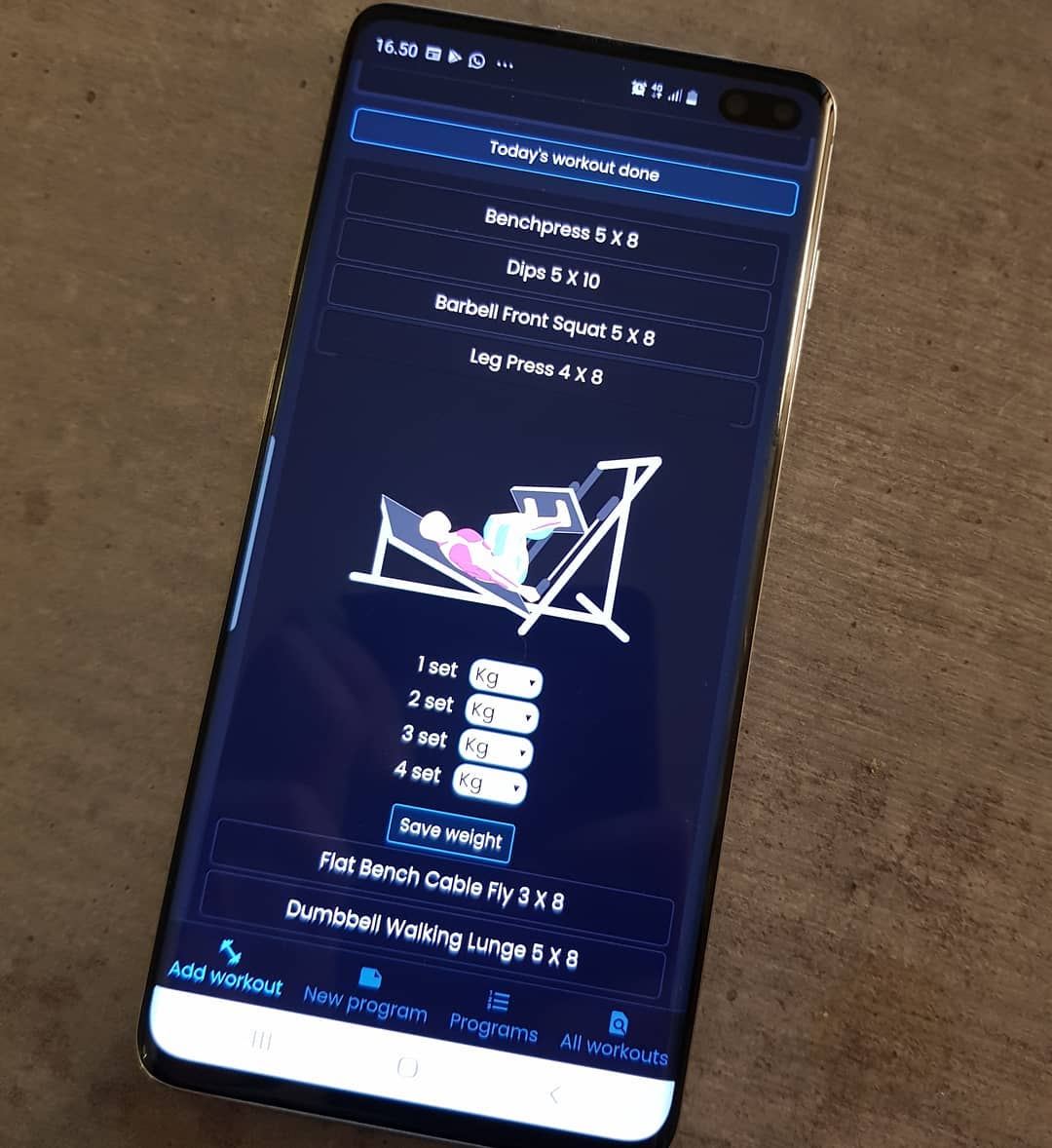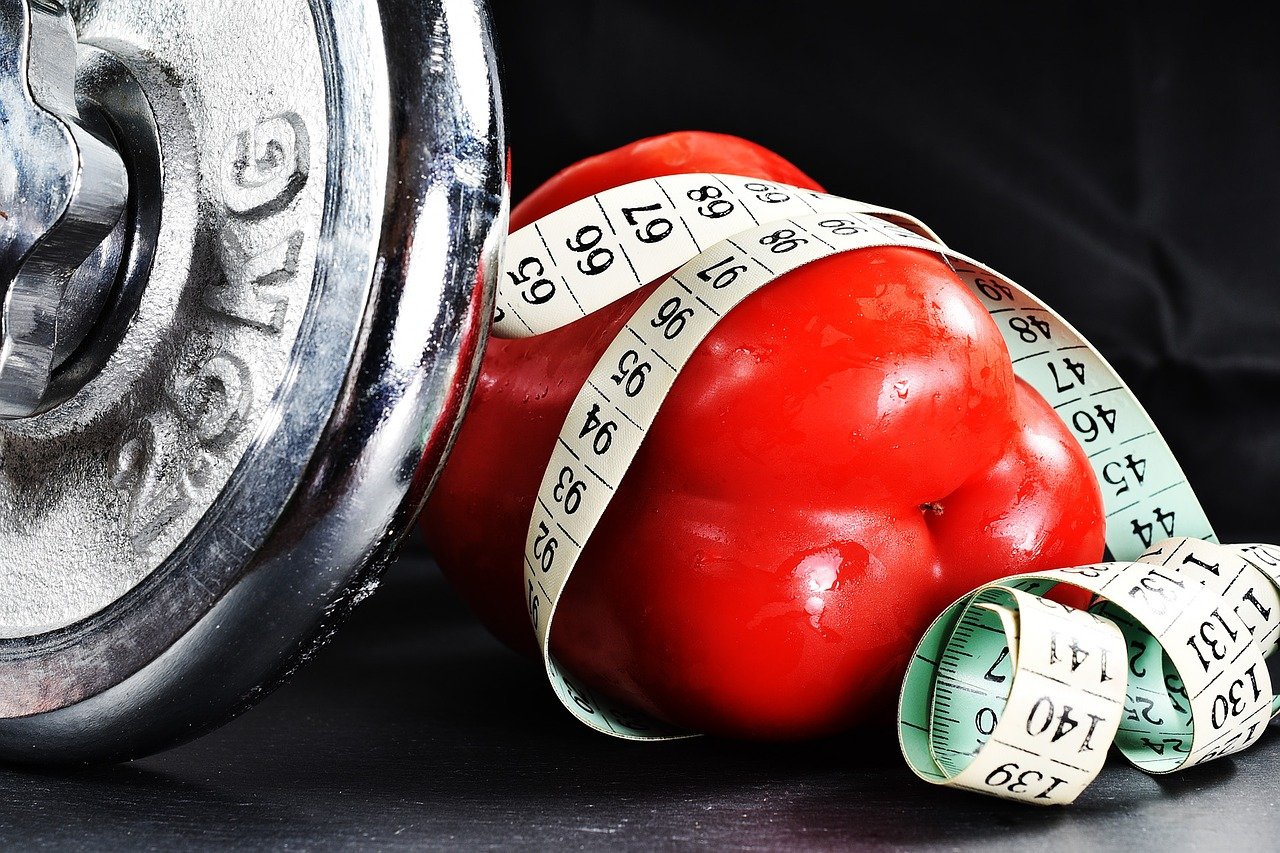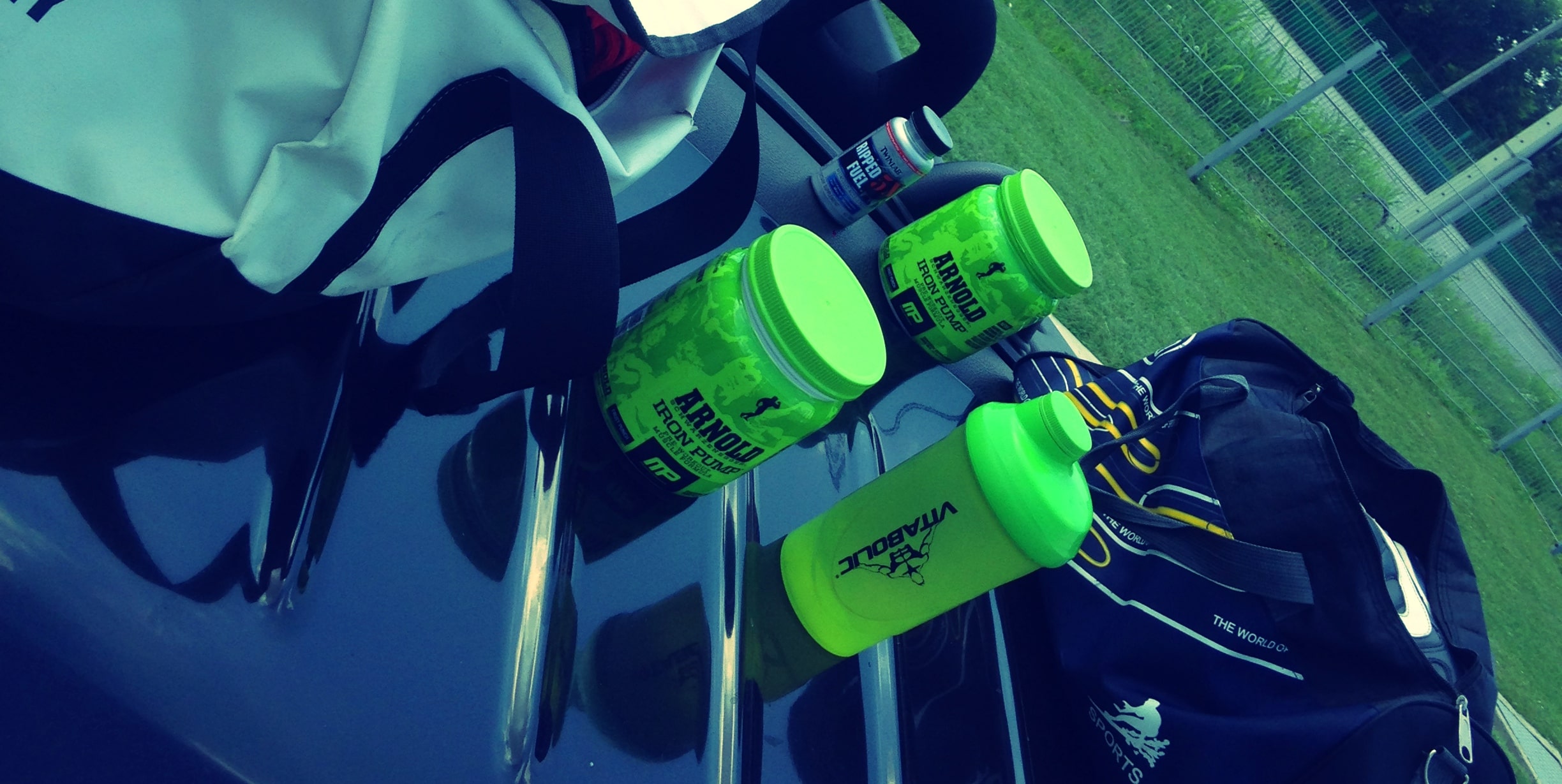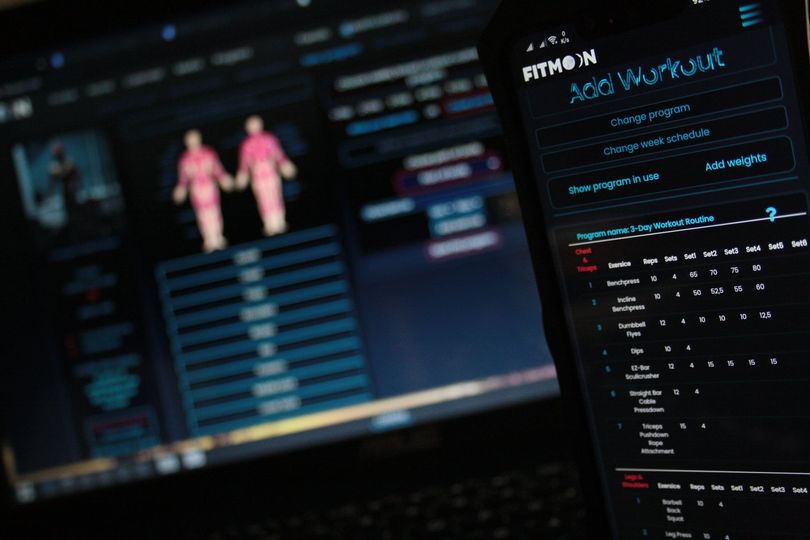klick here


Food
Sexy, strong muscles
The best food after the gym

The general rule of thumb when exercising in the gym is that you should consume 0.8 grams of carbohydrates for every pound of body weight, within 30 to 60 minutes after your workout. In addition, you need to ingest 0.2 to 0.4 grams of protein for every pound of your body weight, for best results....
Since all this is a bit more complicated than that, here are some suggestions on what you could eat after training, and what is the appropriate ratio of carbohydrates and proteins, which will help build muscle in the critical period after training.
Fried mixed chicken
Chicken is a great source of protein, and after training, white rice will actually benefit you more than wholemeal. Add vegetables for better taste and even more nutrients.
Dried and nuts
If you do not have the time or opportunity to eat a specific meal half an hour to an hour after training, you can always opt for nuts, which will give you protein, and dried fruit, which will give you carbohydrates, which are easily digested and used by the body. maximum.
Tuna and integral crackers
Tuna has little fat, but plenty of protein and healthy fatty acids, which are good for the heart. On the other hand, crunchy crackers are a great source of carbohydrates. Skip the mayonnaise, and opt for a combination of lemon juice, olive oil and a little mustard with the fish.
Cornflex and skim milk
Find a better cornflakes than whole grains, which is a good source of protein, carbohydrates and important vitamins and minerals today, and milk is a good source of casein and whey protein.
Omelet of egg whites and spinach
Eggs are a top source of protein when it comes to food. Spinach, on the other hand, is one of the most alkaline foods, which means that it reduces the unhealthy acidic environment in the body, and it was recently discovered that it contains plant steroids that help muscle growth. Mix egg whites, milk and spinach and make yourself an omelet on which the scents will be grateful.
When and what to eat

People who go to the gym need a different diet before and after training, in order to cope with physical exertion.
Whether we go to workout to increase our muscle mass, to lose weight or to maintain our body, we need healthy fuel at the right time.
There are people who either omit one or more main meals or eat insufficiently. The idea was perpetuated that if we did not eat before or after training, more calories would be burned. This idea is a simple myth!
How long do we eat before training?
Whether we train at the beginning of the day, at noon or in the evening, we need energy to sustain the effort and achieve the desired results....
It is recommended to eat at least 2 to 3 hours before training.
Why 2 or 3 hours?
After eating we need to give the body some time, during which time digestion begins. Do you know when you went to the sea or the pool and your family wouldn't let you into the water two hours after you ate? It's about the same principle as swimming. In our case, if you enter the gym with a full stomach, the training will not have the desired performance and you will feel tired.
The quantities are adjusted over time, it is important to choose the foods described below and eat as much as you feel the need for each.
Be very careful not to overdo it with food. It doesn't just matter when we eat, but also what we eat.
What do we eat before training?
Before training, a serious, healthy meal with foods that have a specific purpose is recommended. By dividing food according to the purpose of training, food helps us achieve our goals.
For best results, we group foods consumed before training into two broad categories:
Foods that give the energy needed for training
foods that create a hormonal environment conducive to increased muscle mass or fat burning.
If you want to gain muscle mass and have a fast metabolism, then you can eat more complex carbohydrates. Apart from carbohydrates, proteins and fats should not be forgotten either. You can try:
Carbohydrates: brown rice, oats, corn, peas, chickpeas, lentils, vegetables
proteins: meat, fish, eggs
fats that can be included in protein sources or you can use a separate source such as butter, cream, vegetable oils, avocados, nuts, seeds
If you have carbohydrates in the program, there are two options:
Complex carbohydrates should be eaten 1-2 hours before training, depending on how you notice that they give you energy.
Careful! A large amount of carbohydrates too close to training can ruin your training.
if you can't eat a serious meal before training you can take an average amount of carbohydrates even an hour before training, so that it provides you with energy during training.
What to eat after training?
For fear of putting back the grams of melted fat at the gym, there are people who go hungry and flatly refuse to eat after training.
The post-workout meal is the most important meal of the day, along with the morning meal. Everything you eat after training will be absorbed quickly. This is because muscle fiber destroyed by strenuous exercise needs quality nutrients to recover.
We recommend that the post-workout meal be rich in:
Protein amino acids: red meat, chicken, turkey, fish
Carbohydrates: candied nuts and fruits, quinoa, brown rice
Green vegetables: spinach, broccoli, asparagus, cauliflower.
Pay close attention to the amount of food both after training, but especially before training. Already here we go into too precise details that either the coach or the nutritionist could provide you.
What you could be left with after this article, however, would be that the food used correctly helps in achieving the goal of training. So don't skip meals and eat smart.
Supplements
Caffeine
and workout

Caffeine helps us exercise better with more concentration, improves concentration and reduces the symptoms of fatigue, researchers claim, and emphasize that a cup of coffee drunk at the right time could help you exercise more intensely and for longer.
Studies show that a person should drink three to four milligrams of caffeine per kilogram of body weight about an hour before training. This amount of caffeine will help you exercise in the gym for as much as 30 percent longer than usual, improve motor skills and increase the desire to exercise, ie persistence, according to a study by the British Coffee Association....
Studies have shown that caffeine increases endurance and performance when it comes to high-intensity exercise, by "reducing" signals in the brain that induce fatigue, and stimulates energy production and fat oxidation.
However, experts warn that, despite all that, coffee should not be drunk constantly, because excessive consumption could have consequences such as insomnia, anxiety, headaches, high blood pressure. "Excessive consumption of caffeine can also cause the level of homocysteine in the blood, and even increase the risk of heart attacks, dementia," said clinical biochemist Dr. Gil Hart.
Personal trainer Jack Braniff thinks that it is still good to drink coffee before training, but do not overdo it.
"Coffee has been proven to help you lose weight, but you have to be careful because too much caffeine can affect the adrenaline system and disrupt your sleep, increase the level of the hormone cortisol and eventually lead to weight gain."
Coach Branif says that the recommended dose for an average person is around 400 milligrams, or four cups of coffee a day, and that this amount will not leave any negative consequences on the body.
Pre-workout supplements
and its action

Pre-workout products can take your workout to a whole new level. Not only will you increase your strength and endurance, but you will also increase protein synthesis, speed up metabolism, reduce muscle loss and create an optimal hormonal environment for muscle growth.
Not all pre-workout supplements are the same. You should always choose one that contains active ingredients and powerful plants. Green tea has decent thermogenic effects due to its caffeine content, so you will find yourself on the list of products already.
If you want more strength and energy, use pre-workout supplements that contain taurine or creatine. Muscle growth is associated with high doses of BCAAs, whey protein and fast-digesting carbohydrates. To increase endurance, use products that contain citrulline maleate, beta-alanine, antioxidants, N-acetyl-cysteine and alpha lipoic acid. These ingredients will harness your energy, delay muscle fatigue and speed up recovery between workouts. Some pre-workout supplements contain red blood cells from damage and improve blood flow during exercise....
These dietary supplements can give you extra strength to complete your workout. Regardless of their composition, it can affect all or some of the following aspects: endurance, energy, strength and muscle building. These products are designed to increase your energy and improve your focus during exercise. You will enjoy your training more, design heavier weights and push further than you normally do.
Additional options before exercise can be used by men and women. They are ideal for beginners as well as for advanced exercises. The pre-workout supplement has a number of positive effects on the cells within the human body, which bodybuilders have long recognized and started to extract the most useful from in order to train more on the steps. They play a significant role in the transport of information between cells, working as neurotransmitters, and they can especially boast the abilities of a wider vein and blood vessels, enabling easier blood flow.
You need to be very pruned and not exceed the daily recommended dose, especially in people who have heart problems can be risky, numerous studies have proven that Pre-workout supplements have a number of positive aspects, some of which are important in strengthening the immune system, regulating mortality and cell life cycle, but also through other effects.
By widening the bloodstream, they help to deliver oxygen to the muscle cells more easily, which results in raising the threshold of exhaustion. More oxygen in the muscles means more energy and the possibility of longer training.
The feeling of a "muscle pump" is something special during exercise, and to have a stronger pump means to have a stronger will to train longer and stronger than ever. Again, another phenomenal consequence of the increased blood flow to the muscle cells, which, in addition to the mentioned oxygen, also delivers nutrients and anti-inflammatory components to the broken fibers, thus enabling the muscles to recover much faster.
Mitochondria are elements of the body's cells in which nutrients and oxygen are converted into energy, these are the places where fats are burned. Research has shown that they stimulate the production of new mitochondria, but also make existing mitochondria larger, thus helping to melt fat more strongly.
Protein and workout

The word protein comes from the Greek word "protos" and means the first element. Protein is the basic and most important component of the cell. They are responsible for the proper functioning of the body, for strength, for firmness. Simply, proteins recover our muscles after a hard workout. The origin of proteins can be from animal and plant foods. The difference is that proteins from plant foods, unlike proteins from animal foods, do not contain saturated fats, do not contain metabolic residues from the animal's body, or chemical residues from the treatment that the animal meat has undergone. Proteins can be found: in food, in the form of a protein drink (shake) and in the form of chocolates.
PROTEINS IN FOOD
Proteins of animal origin (eggs, meat, fish, dairy products) - eggs have few carbohydrates, but also a lot of fat that is in the yolk, so most athletes throw out the yolks and eat only egg whites. They are an excellent source of vitamins B, D, A and E. Red and white meat is full of protein, but red meat has a lot of fat in it, so it should not be present in the diet every day, unlike white meat, which has a strong low fat and the healthier it is. Fish is also a very important link in this chain of healthy eating. It is rich in proteins, minerals and contains less than 1% fat and is easily digested. Dairy products such as milk, cheese, yogurt are excellent sources of iodine, phosphorus, calcium, potassium, B vitamins and zinc, which is reason enough to be part of your diet. Vegetable proteins (peas, beans, green beans, almonds, lentils, cereals, walnuts) - a great advantage of plant sources of protein is that they are not combined with saturated fats and cholesterol, such as eggs. They are low in fat and high in fiber and minerals. And the point is to combine them with other sources of protein....
PROTEIN SHAKES
What many do is not take food after training, because they "burned calories" and achieved the goal. Error! After training, the muscles need a quick recovery immediately, and a little later a real meal. This drink, which is better known as "whey protein" allows muscle recovery and is most effective after physical exertion. Especially for those who do not get enough protein through the food they eat every day. "Whey protein" is pure whey protein and is obtained by converting milk into cheese. Whey proteins are fast-acting and, unlike those from food, they reach the muscles very quickly, feed them and prevent their breakdown and encourage building. Proteins are powdered and can be of different flavors, such as vanilla, chocolate, hazelnuts and others. They are a great combination with some fruits, such as bananas, strawberries, raspberries, forest fruits, etc. They can be made with milk or water, the difference is that when they are made with milk, they are slower to digest. But neither hurts and it’s mostly all a matter of taste. When all that is nicely packaged, you get a great drink that everyone who sees it would say is impossible not to add a single kilogram, and it brings us to a great look.
PROTEIN CHOCOLATES
Protein bars are a rich source of protein. They contain quality fats, such as flaxseed oil and zero trans fats, vitamins and minerals. Delicatessen candy with a minimum of bad calories. The advantages of consuming these chocolates are: high protein content, they are practical, you do not have to bring a shaker, milk, etc., and even when you are in a hurry and do not have time for a normal meal, chocolates are a quick and easy solution. Another advantage is that they serve as a substitute for sweets. Instead of eating plain chocolate full of calories and sugar, include an amount of protein that you can't find in regular chocolates. There are different flavors of these chocolates, strawberries, caramel, peanuts, lemon, vanilla, banana…
Proteins are, simply put, dietary supplements. Sometimes they can be a substitute for a meal, when you are in a big hurry and do not have time to eat the right food, but this must not become a habit and must not become the only type of meal during the day. Protein has the greatest effect when drunk after training - it is "later". If consumed before training, it cannot, of course, be harmful. What's more, if you happen to be in a hurry all day, you haven't eaten and you're training ... you should drink protein so you can do a good workout. But protein is primarily used immediately after training because that is when it has the greatest effect. Except after training, protein, as I already mentioned, can be drunk for dinner or before bed, as a substitute for a meal, but only on the condition that it does not become the only type of meal during the day. After training, a period of 2 hours is the most important because then it is necessary to enter as many nutrients as possible, so the best choice would be protein no later than 30 minut after training and after 60 minutes meal.
"YOU SHOULD BE MODERATE IN EVERYTHING"
No matter how healthy or necessary our proteins are, moderation is the key to any door. Which means, just as the best chefs in the world have the right measures for making the most delicious dishes ever, so there is a measure for protein. It is very common for athletes to overdo their protein intake because they think they will have better results if they take in more protein. By no means. What's more, it can lead to a threat to metabolism, weight gain, dehydration, etc. The recommended level of protein intake for the general population is from 12 to 15% of the total energy intake. 0.8 g of protein per kilogram of body weight is enough for the majority of the population. However, athletes have twice the protein needs of people who are not physically active. Thus, a man who is not physically active and weighs, say, 75 kg, needs 60 g of protein per day, but athletes have 60 g to make up for everything they need, so that the number is in their case 130 g maximum. Some athletes sometimes overdo it. So ... to reach the desired goal - moderation is the answer.
Finally, what is the conclusion of this text? Just like when a house is built and the foundation is laid and it is the basis of everything, so is muscle protein. Don't make a mistake and just use supplements, ie shakes and chocolates, because they are not better than food. Real food, ie. Proteins in food are always in the first place and supplements are just one dietary supplement that helps you achieve your goals. Combining all kinds of proteins in the right measure and good training ... and your body will be healthy.
Workout
When would be a good time start training for the summer body?
 Today!
Today!Getting in shape does not happen overnight. But in a half year you can make some great results! In a half year you have the possibility to get some excellent results.
Now we are living in some challenging situation caused by the Covid virus. Gyms are closed and it can be hard to find motivation to workout.
Exercise is still proven to be really effective way to control your well being. Here is one good article about the subject; 5 Mental Benefits of Exercise
How to make a new habit
 Forming a new habit takes some time! Starting to do your daily routines differently is not the easiest thing. But when doing things regularly, eventually they will form you a habit. Would you want to start a new good habit? Start to
working out or eat healthier?
Forming a new habit takes some time! Starting to do your daily routines differently is not the easiest thing. But when doing things regularly, eventually they will form you a habit. Would you want to start a new good habit? Start to
working out or eat healthier?Few tricks to get started,
1. Try doing the new routine daily. It can be easier to form a habit with starting to do it daily, instead of a few times a week.
2. Don't make things to complicated. Want to start working out? Make a routine to go to the gym. Don't focus so much on what you should do on the gym, most important is you start going to the gym. A habit will form sooner than you would think!
3. Make targets! There is sure some reason why you want to do something differently. Is it health or feeling good, or something else. In the point when you feel loosing motivation, remind yourself of your targets!
4. Get a buddy! You dont need to do everything alone! Try to find someone to motivate you when you are losing the motivation. Want to workout, ask your friend to join to the gym?
5. Spend time with people that have some sort of targets in life!
6. Write down your plans and targets! If you are making gym targets Fitmoon is a place where you can make your plans digital!
7. Do it for yourself! There will always be people that judge you and say you can't do it and ask why are you doing something like this. Do what you want to do, dont think so much about what others think!
Other

To access Fitmoon platforms all content, Join today for free!
Welcome!
 Fitmoon is a new community for everyone that is intrested in healthy lifestyle and working out! On Fitmoon you can make your own gym journal and share everything with your friends!
Fitmoon is a new community for everyone that is intrested in healthy lifestyle and working out! On Fitmoon you can make your own gym journal and share everything with your friends!Fitmoon have now published also the first android app! You can access it from google play store
You can Join Fitmoon for free! :)
